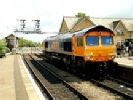Archive Section




C. Beaumont of Silverlink -
Talk held on Tuesday 7th November 2000
Mr. Beaumont is new to the rail industry, having moved from another National Express Group Company to Silverlink in April, 2000.
He started his talk with a few words on his background, before going on to give his reasons for the split of Silverlink's franchise into two sectors -
In the first part of his talk, Mr. Beaumont spoke about the security, cleanliness and renovation work that is now being carried out. At the centre of this is the rebuilt Willesden Jct. station, which, apart from new passenger facilities, also includes a Control office for the Metro area and the CCTV control room. Closed Circuit Television is being installed in many parts of the Metro area and in addition to this, passenger help points have been installed at stations on the Gospel Oak -
Security guards are used at a number of locations and Silverlink Metro have introduced their own security teams, whose duties also include on-
The on-
One point of note was Mr. Beaumont's strong dislike of graffiti. He highlighted the work involved in combating this problem, but noted that some care had to be given to this -
A question was raised regarding revenue collection, to which Mr. Beaumont was able to point out the very fine line between the acceptable costs of revenue protection when applied to what is essentially a high-
There was a brief mention of the maintenance facilities at Bletchley, where all Silverlink stock is maintained in-
Renovation of class 150's is underway, including reconditioning all the seating, addition of on-
Services on the North London Line are very well patronised and run at 15-
Future plans for the North London Line, to ease the overcrowding, include additional services in the peak hours and, more long term, to expand stations to accommodate 6-
Looking further ahead, there are plans to reopen the line from Dalston back towards the former Broad Street terminus and join up with the London Underground East London Line at Shoreditch. There are also plans to extend the Barking service from Gospel Oak through to Clapham Junction. Some engineering work will be required at Gospel Oak for down trains to use the single platform.
Mr Beaumont showed an obvious enthusiasm for his new job and but for the lack of time would no doubt have been pleased to answer many more questions.